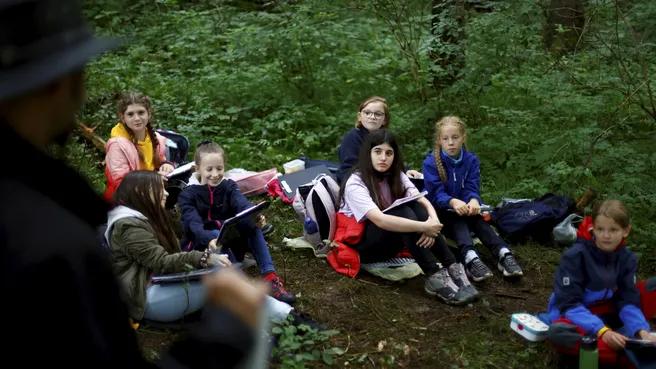For years, insufficient physical activity and increased stress among children and adolescents have been major societal concerns. Schools often exacerbate these issues due to rigid structures and infrastructural shortcomings. To address this problem, the international concept of "Education outside the classroom (EotC)" has gained traction, promoting curriculum-compliant teaching that regularly takes place outside the traditional classroom setting.
Prof. Dr. Filip Mess, head of the Associate Professorship of Didactics in Sport and Health, and Dr. Jan Ellinger aim to advance this teaching model in Germany as a follow-up to the "Outdoor Classroom (DU)" project. They plan to develop a framework for outdoor teaching that aligns with educational standards while integrating climate-relevant knowledge for students and teachers. This initiative is being funded by the German Federal Ministry of Food and Agriculture with a grant of 1.1 million euros, of which approximately 440,000 euros are allocated to the Department Health and Sport Sciences.
The collaborative project consists of four sub-projects, with Associate Professorship of Didactics in Sport and Health leading the initiative, primarily focusing on health sciences. "The challenge, but also the exciting opportunity, lies in working together with colleagues from disciplines that are, in some cases, new to us. It will be a pleasure to combine different approaches, methods, and perspectives," explains Prof. Mess.
The project will incorporate both educational and forestry-related research to further develop the concept. It will also examine the effects of outdoor education on biodiversity, sustainability, bioeconomy, and environmental awareness through learning experiences in urban and rural natural environments. The project aims to partner with 10 to 15 schools from various educational backgrounds. "The concept has been well-established in Scandinavian countries for quite some time and is much more widespread there than in Germany. In Denmark, there is already a scientific foundation that we lack here. We aim to fill that gap," says Dr. Jan Ellinger.
Over the course of one school year, the project will accompany classes participating in outdoor teaching for the first time, collecting various data in the process. In addition to traditional surveys, innovative methods such as motion sensors, cortisol measurements via saliva samples, and mobile EEG measurements will be used. "Our hypothesis is that the increased space for movement outdoors not only enhances physical activity but also positively impacts stress, attention, and relaxation," says Ellinger. A key focus will be comparing the effects of outdoor education with traditional classroom settings to determine how cognitive and emotional aspects differ in various learning environments.
The data from the health science studies are expected to provide insights into the effects of outdoor education on stress and student health promotion. "In Germany, more and more schools have been experimenting with these alternative approaches in recent years, as the benefits for all involved are becoming clear. Students are more active and show improved learning outcomes, while teachers also benefit from the changes," adds the research associate.
These approaches also encourage stronger interdisciplinary collaboration, with a focus on practical learning rather than rigid subject-specific thinking. "The most obvious change we aim to achieve is increased physical activity. In pilot studies, only the children who participated in outdoor education met the WHO's physical activity recommendations – without any explicit focus on movement. The mere change in setting, where learning is associated with movement rather than sitting, led to this effect," explains Jan Ellinger.
Additionally, the project aims to foster interdisciplinary collaboration among various experts to develop practical teaching concepts. "Alongside the health science perspective, we integrate special education, pedagogical, and nature-based approaches, resulting in a holistic concept that ensures the practical applicability of teaching designs, methods, and materials," concludes Jan Ellinger.
Other Project Partners:
Technical University of Munich, Professorship of Urban Productive Ecosystems
Julius Maximilian University of Würzburg, Chair of special Education I – Education for people with Learning Disabilities
State association Bavaria of the Conservation association for German Forests
Various school partners
To the homepage of the Associate Professorship of Didactics in Sport and Health
Contact:
Prof. Dr. Filip Mess
Georg-Brauchle-Ring 60/62
80992 Munich
Phone: +49 89 289 24520
Email: filip.mess(at)tum.de
Dr. Jan Ellinger
Georg-Brauchle-Ring 60/62
80992 Munich
Phone: +49 89 289 24794
Email: jan.ellinger(at)tum.de
Text: Bastian Daneyko
Photos: Alexander Kaya/Private


